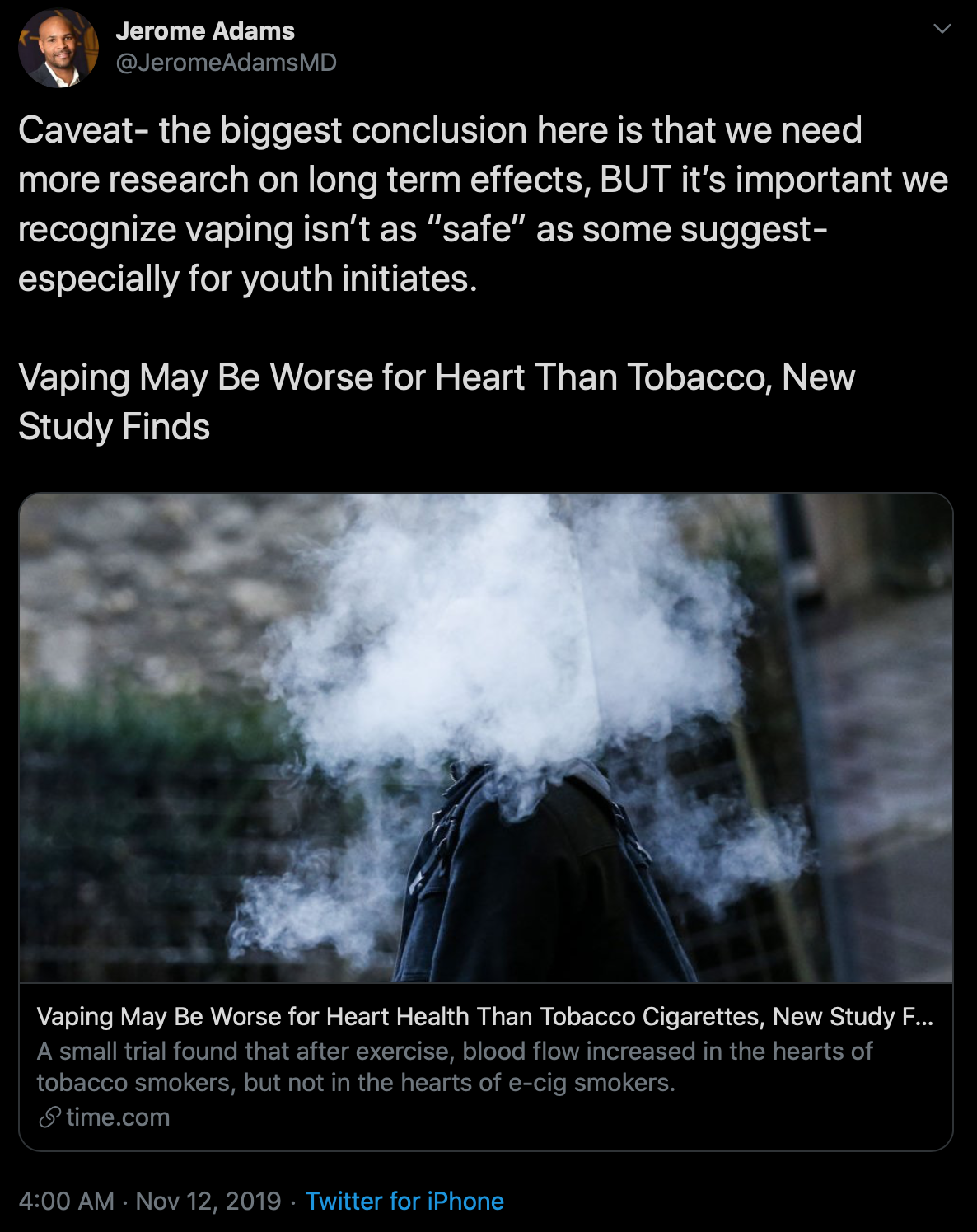It hasn't been a good year for U.S. Surgeon General Jerome Adams.
Back in July, Dr. Adams endorsed giving post-operative patients Tylenol instead of morphine. Let's think about surgery for a moment. It often involves cutting through a person's skin and muscle, poking and pulling at stuff inside, and then sewing it all up like a patch on worn jeans. It's painful, and a couple of Tylenol probably won't cut it for many people.
Worse, Dr. Adams supported his statement by referring to an absolute dumpster fire of a paper published by authors in Iran. The paper concluded that Tylenol was just as good as morphine at managing post-operative pain, but it suffered from a few flaws: The sample size was pathetically small and there was no control group. At the time, my colleague Dr. Josh Bloom rightly criticized Dr. Adams and pilloried the study.
Because of our work, Dr. Adams had to backpedal pretty ferociously a few days later.
Surgeon General Endorses Study Saying Vaping Is Worse for Heart than Smoking
 Unfortunately, it doesn't look like the Surgeon General learned his lesson, namely, that he shouldn't endorse dubious statements and back them up with shaky research. He's done it yet again. (See image.)
Unfortunately, it doesn't look like the Surgeon General learned his lesson, namely, that he shouldn't endorse dubious statements and back them up with shaky research. He's done it yet again. (See image.)
Dr. Adams is correct that vaping isn't free of harm and that young people absolutely should not be vaping for fun. But his endorsement of the statement that vaping is worse for the heart than tobacco is completely absurd.
One of the citations he used in his Twitter thread is a press release from the American Heart Association that makes the patently false claim in its headline that vaping is "not safer than traditional cigarettes." The AHA justifies that sensationalist headline with two studies, the first of which shows that LDL ("bad") cholesterol levels are higher in vapers than non-vapers, and the second of which showed that blood flow to the heart was lower when smokers vaped than when they smoked cigarettes.
The studies were given as oral presentations at an AHA meeting, so there are no publications to examine. But there are certainly plenty of unanswered questions.
For instance, why would the AHA make such a sweeping generalization based on two small, unremarkable studies? That second study only included 19 people. Nicotine is a coronary vasoconstrictor, which means we expect blood flow to the heart to be reduced when a person inhales nicotine. The fact that the effect was worse when smokers vaped than when they smoked cigarettes may be related to dose. Did they receive a larger nicotine dose when they vaped? We aren't told. (Additionally, whether smoking cigarettes increases or decreases coronary blood flow appears to be linked to the presence of underlying coronary disease. And it's a good bet that future research will show vaping to be linked to fewer cases of coronary artery disease.)
Nicotine is thought to change blood lipid profiles, so it's not a surprise that smokers and vapers have elevated LDL cholesterol levels. (Interestingly, research suggests that nicotine patches and gum do not cause this effect.) But it's ludicrous to conclude that vaping and smoking are essentially the same.
Why? Because cigarette smoke contains some 7,000 chemicals, about 250 of which are known to be harmful, according to the National Cancer Institute. Vaping fumes contain far fewer.
The AHA press release ends with this doozy:
Statements and conclusions of study authors presented at American Heart Association scientific meetings are solely those of the study authors and do not necessarily reflect the Association’s policy or position. The Association makes no representation or guarantee as to their accuracy or reliability. [Emphasis added]
What. The. %&$&#?
So, the AHA sensationalizes research presented at its meeting in a press release (which it eagerly sends out to the media), then includes a disclaimer that the research may not be accurate and the association doesn't necessarily endorse it. And then the Surgeon General posted it on Twitter.
This is science communication at its absolute worst. We should expect better from the Surgeon General and the American Heart Association.




